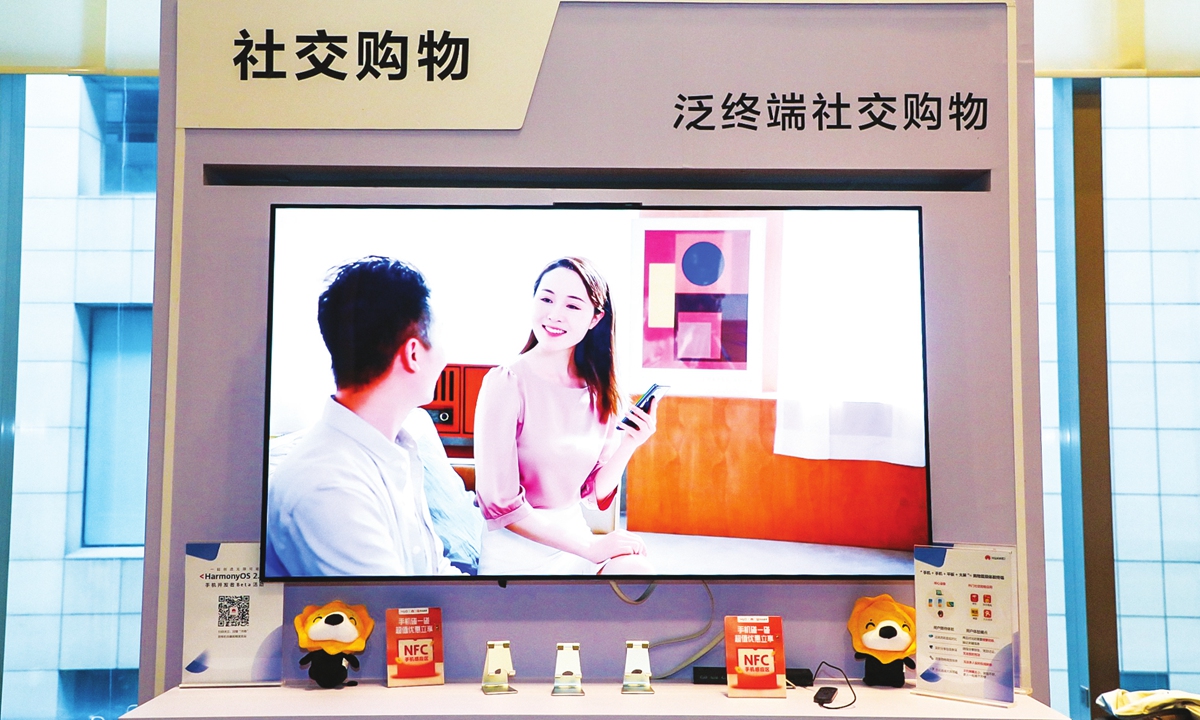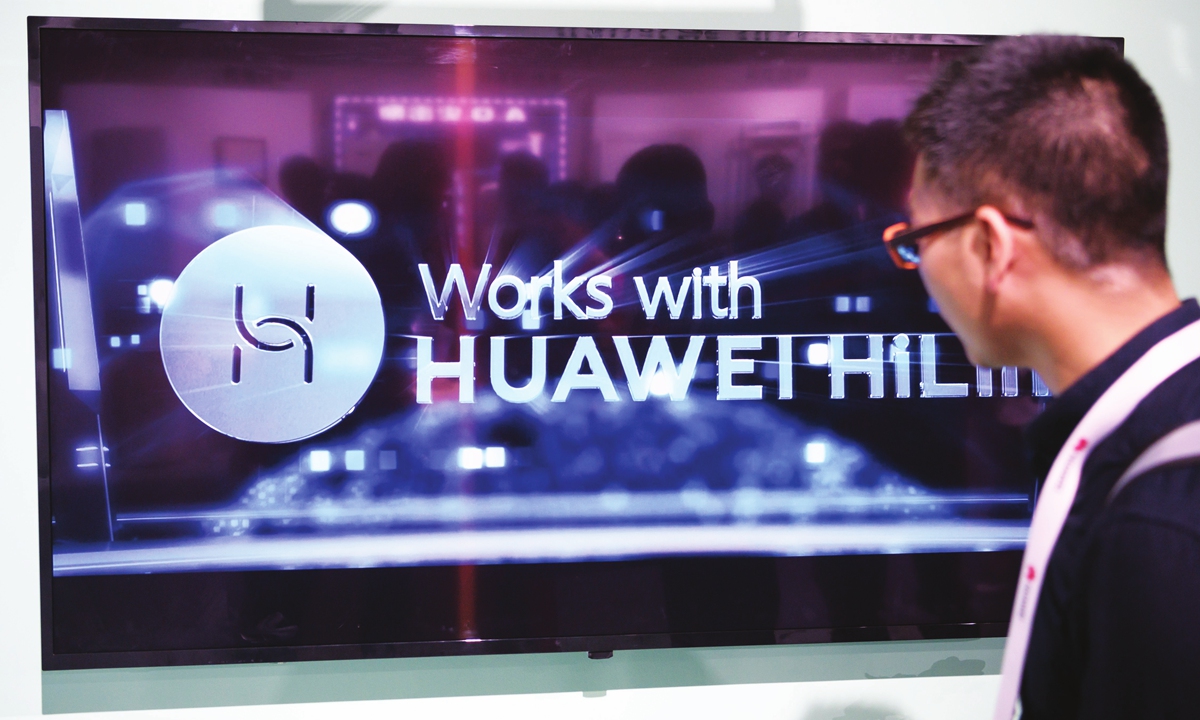Huawei’s self-developed HarmonyOS to disrupt the future of e-commerce shopping
Source: Global Times Published: 2020/12/24 17:23:36
Decades ago, people could hardly imagine that online shopping would one day become one of the main ways consumers would purchase goods. The emergence of Alibaba's Taobao subverted the public's understanding of the commodity market and even threatened the status of the real economy. Not long after, JD.com also targeted the dividends of e-commerce shopping, entering the arena at an early stage. The two e-commerce platforms now dominate China's e-commerce market.

With the rise of Tencent's social media platform WeChat, social e-commerce allowed the public to experience the joy of sharing the best deals they found with each other.
Another e-commerce platform Pinduoduo has forged its own path by taking sharing to a new level by leveraging the interaction between WeChat users for group puchasing, becoming the third force in the domestic e-commerce market.
If Taobao is one single person's lonely experience, then Pinduoduo is undoubtedly a carnival for a group of people to purchase items together. It is not difficult to find that shopping in the past few years has changed from a platform-led "Taobao method" to a user-centric and decentralized "Pinduoduo method."
The trend has become so prominent that even Alibaba and JD.com are also constantly breaking down and refactoring their systems to achieve a decentralized e-commerce model.
Many people wonder if shopping has reached its ultimate form, but the answer is obviously no - as Chinese smartphone maker Huawei has introduced its own shopping model of the future.

Establishing a seamless experience across devices and forming a unified ecosystem and operating system is the future that Harmony looks forward to. For Huawei, instead of waiting for the next industry opportunity, it is better to create these opportunities itself.
"Shopping around" is the embodiment of the savvy consumer. At present, if consumers want to compare the prices of goods on different shopping platforms, they can only manually switch between different interfaces and remember key information themselves. But Huawei can make comparing prices more convenient through "multi-screen collaboration." On the PC end, consumers can access three e-commerce platforms at the same time in one centralized window to compare prices.
In the future, mobile phones equipped with the HarmonyOS can "transfer" your shopping cart without third party communication software. When you see a product you want to share with your friends, all you need to do is "touch" your phones together to immediately share a shopping link.
For long-distance scenarios, Huawei also provides a solution to share shopping links through Changlian. It's worth noting that friends can also share their screens through Changlian, make notes on product pages and give their advice.
For "group buying" scenarios, HarmonyOS can make it possible to share shopping carts with just one click. For instance, when consumers find a special offer that provides a discount when a certain amount of money is spent but are unable to find enough items to reach requirement, they can bring in their friends into the purchase so both may enjoy the full discount.
Huawei's shopping super terminals will cover mobile phones, large screens and tablets. This three-pronged coordinated cooperation will improve shopping experiences and more devices are likely to be added in the future. Each device is no longer an isolated individual, but a connected smart terminal based on the HarmonyOS. Even if consumers pick up a different device, the experience will be exactly the same, completely breaking down the barriers between devices.
Looking back, every technological turning point has led to the rise of different e-commerce platforms. The emergence of e-commerce lead to Taobao and JD.com, and group shopping was the originator of Pinduoduo. Huawei doesn't intend on becoming just another e-commerce platform; it is building an epoch-making shopping model that will disrupt the industry and revolutionize the consumer experience.
Many people think that HarmonyOS aims to rival Android, but this is not the case. This is not a system limited to mobile phones, but a comprehensive cross-terminal operating system.
The two are not essentially on the same track, but it is foreseeable that HarmonyOS will bring new changes to the industry, and will also promote the birth of super services and super applications.
Newspaper headline: The next level

The pan-terminal social shopping platform demo booth at the Huawei Developer Conference 2020 (Together) on September 10 in Dongguan, Guangdong Province Photo: Courtesy of Huawei
However, the shopping experience on Taobao and JD.com are relatively "limited" with consumers' having separate shopping carts for each individual platform.With the rise of Tencent's social media platform WeChat, social e-commerce allowed the public to experience the joy of sharing the best deals they found with each other.
Another e-commerce platform Pinduoduo has forged its own path by taking sharing to a new level by leveraging the interaction between WeChat users for group puchasing, becoming the third force in the domestic e-commerce market.
If Taobao is one single person's lonely experience, then Pinduoduo is undoubtedly a carnival for a group of people to purchase items together. It is not difficult to find that shopping in the past few years has changed from a platform-led "Taobao method" to a user-centric and decentralized "Pinduoduo method."
The trend has become so prominent that even Alibaba and JD.com are also constantly breaking down and refactoring their systems to achieve a decentralized e-commerce model.
Many people wonder if shopping has reached its ultimate form, but the answer is obviously no - as Chinese smartphone maker Huawei has introduced its own shopping model of the future.

A visitor checks out a Huawei device at the Huawei Campus in Dongguan, Guangdong Province on August 10, 2019. Photo: VCG
Huawei's self-development Harmony operating system (OS), based on distributed technology, is not only a brand-new way to operate for consumers, but also possesses profound epoch-making significance. In the future, HarmonyOS will act as a convenient shopping super terminal for consumers. At that time, the public's shopping experience will undergo new changes.Establishing a seamless experience across devices and forming a unified ecosystem and operating system is the future that Harmony looks forward to. For Huawei, instead of waiting for the next industry opportunity, it is better to create these opportunities itself.
"Shopping around" is the embodiment of the savvy consumer. At present, if consumers want to compare the prices of goods on different shopping platforms, they can only manually switch between different interfaces and remember key information themselves. But Huawei can make comparing prices more convenient through "multi-screen collaboration." On the PC end, consumers can access three e-commerce platforms at the same time in one centralized window to compare prices.
In the future, mobile phones equipped with the HarmonyOS can "transfer" your shopping cart without third party communication software. When you see a product you want to share with your friends, all you need to do is "touch" your phones together to immediately share a shopping link.
For long-distance scenarios, Huawei also provides a solution to share shopping links through Changlian. It's worth noting that friends can also share their screens through Changlian, make notes on product pages and give their advice.
For "group buying" scenarios, HarmonyOS can make it possible to share shopping carts with just one click. For instance, when consumers find a special offer that provides a discount when a certain amount of money is spent but are unable to find enough items to reach requirement, they can bring in their friends into the purchase so both may enjoy the full discount.
Huawei's shopping super terminals will cover mobile phones, large screens and tablets. This three-pronged coordinated cooperation will improve shopping experiences and more devices are likely to be added in the future. Each device is no longer an isolated individual, but a connected smart terminal based on the HarmonyOS. Even if consumers pick up a different device, the experience will be exactly the same, completely breaking down the barriers between devices.
Looking back, every technological turning point has led to the rise of different e-commerce platforms. The emergence of e-commerce lead to Taobao and JD.com, and group shopping was the originator of Pinduoduo. Huawei doesn't intend on becoming just another e-commerce platform; it is building an epoch-making shopping model that will disrupt the industry and revolutionize the consumer experience.
Many people think that HarmonyOS aims to rival Android, but this is not the case. This is not a system limited to mobile phones, but a comprehensive cross-terminal operating system.
The two are not essentially on the same track, but it is foreseeable that HarmonyOS will bring new changes to the industry, and will also promote the birth of super services and super applications.
Newspaper headline: The next level
Posted in: PRESS RELEASE